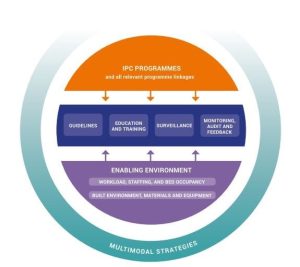By Dr Lucyna Gozdzielewska
The SHIP team reviews the evidence on the effectiveness of national infection prevention and control interventions
Healthcare associated infections remain a threat to patient safety worldwide. However, many of these infections can be prevented by the implementation of effective infection prevention and control measures.
In 2016, the SHIP team conducted a systematic review on the effectiveness of national infection prevention and control interventions. This work was funded and commissioned by the World Health Organization (WHO), and the findings were used by WHO to inform the development of the guidelines on core components of infection prevention and control (IPC) programmes. The aim of these guidelines is to support countries to develop and implement effective strategies for preventing health-care-associated infections and improve patient safety. At the national level core components include (1) infection prevention and control programmes, (2) infection prevention and control guidelines, (3) provision of education and training to healthcare staff, (4) surveillance of healthcare associated infections and antimicrobial resistance, (5) implementation of multimodal infection prevention and control strategies, (6) monitoring infection prevention and control practices and provision of feedback.
WHO, 2023: https://www.who.int/teams/integrated-health-services/infection-prevention-control/core-components
However, the evidence is continuously expanding and new studies on the topic have been published since the publication of our original review and the WHO guidelines. Therefore, we were recently funded by WHO to update our systematic review on the effectiveness of national and subnational infection prevention and control interventions in acute hospitals.
Our updated review identified 36 studies on the effectiveness of infection prevention and control programmes, regulations, and care bundles – which are sets of evidence-based interventions that are implemented together to prevent a specific infection in a specific group of patients. The types of interventions that were identified in our review correspond to WHO core components one and five.
The strongest evidence was found for the effectiveness of care bundles supported by additional strategies facilitating their successful implementation in practice, such as provision of education to staff, support and guidance, reminders or enhancing teamwork and communication. Although some studies also showed the national infection prevention and control programmes and regulations helped to reduce healthcare associated infections in hospitals, this evidence was inconsistent and insufficient to suggest specific recommendations. Furthermore, our review showed that most of the studies were conducted in high-income countries and the evidence from low-income countries was lacking. These countries often face additional challenges to the development and implementation of infection prevention and control strategies, such as the lack of infection data and limited resources. Therefore, further research on national infection prevention interventions is needed, especially in low and middle-income countries.
Our updated systematic review paper on the effectiveness of national and sub-national interventions for prevention of health-care-associated infections in acute hospitals was published in the Lancet Infectious Diseases and can be accessed using this link: https://authors.elsevier.com/c/1gsE4_XVyhTU0H
To find out more about the SHIP team, head on to the GCU website, read the rest of our blogs and follow us on Twitter @SHIPGCU

